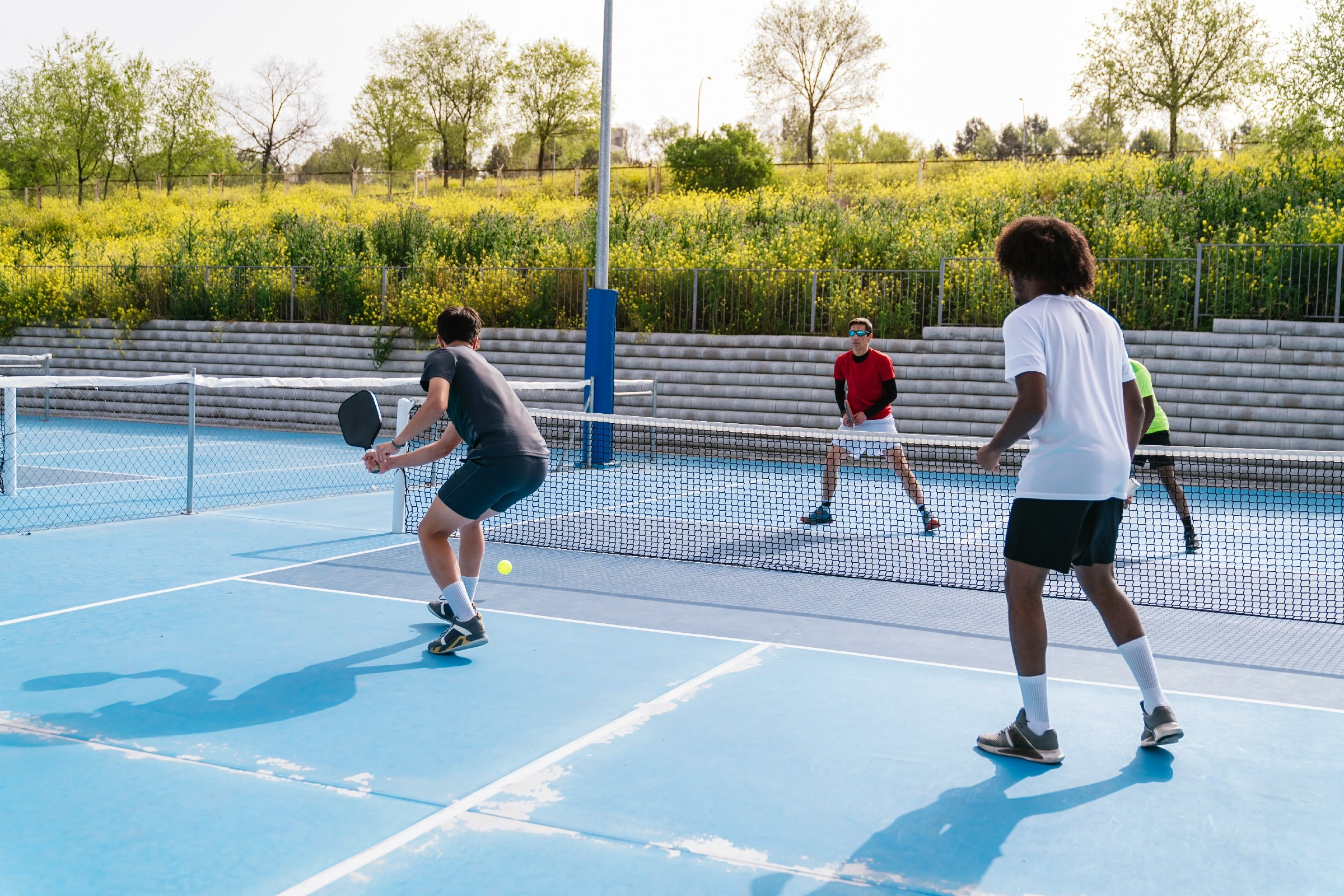Blog
is pickleball trademarked

Is Pickleball Trademarked? Unraveling the Rules of the Game
In a world where sports trends rise and fall with the seasons, few have captured the collective inventiveness quite like pickleball. A delightful blend of tennis, badminton, and ping-pong, this engaging paddle sport has surged in popularity, drawing players of all ages to its courts. With its rapid rise, however, comes an interesting question: Is “pickleball” a trademarked term? As players rally for points and spectators cheer from the sidelines, the exploration of whether this beloved sport’s name is protected under trademark law opens the door to a broader discussion about intellectual property in the realm of recreation. Join us as we delve into the complexities of trademark rights, the origins of this fascinating game, and what it all means for the future of pickleball and its passionate community.
Table of Contents
- Understanding the Origins of Pickleball and Its Trademark Status
- Exploring Trademark Law and Its Relevance to Pickleball
- The Role of the USA Pickleball Association in Trademark Advocacy
- Navigating the Legal Landscape: What Pickleball Enthusiasts Should Know
- Implications of Trademarking Pickleball for Industry stakeholders
- Strategies for Protecting Your Pickleball Brand Without Trademarking
- Q&A
- Concluding Remarks
Understanding the Origins of Pickleball and Its Trademark Status
The fascinating game of pickleball, which captivates players of all ages, traces its origins back to the summer of 1965 on Bainbridge Island, Washington.Created by three friends—Joel Pritchard, Bill Bell, and Barney McCallum—the sport was designed as a leisurely activity for their families. Utilizing elements from badminton, tennis, and table tennis, the game gradually took shape with a unique set of rules and equipment, including a perforated plastic ball and wooden paddles. Over the years, what began as a fun pastime has evolved into a competitive sport, garnering national and international recognition.
As pickleball gained popularity, it became essential for those involved to establish legal protections for the game’s branding and identity. This led to the consideration of trademarking various aspects of pickleball, including its name and related logos. While the term “pickleball” itself is widely used, it is indeed significant to note that certain organizations, like the USA Pickleball Association, have sought trademark registrations for specific logos and branding associated with organized events and tournaments. This effort helps maintain the integrity and distinctiveness of the sport as it expands across demographics and geographical boundaries.
Understanding the trademark status of pickleball can be simplified by examining key aspects:
| Aspect | Details |
|---|---|
| Trademarks registered | Logos and specific terms related to organizations |
| Common Usage | The term “pickleball” is not trademarked |
| Protection Goals | Prevent misuse and enhance recognition |
As the sport continues to evolve, understanding its trademark status is crucial for players, organizers, and enthusiasts alike, fostering a community that respects the game’s origins while embracing its future.
Exploring Trademark Law and Its Relevance to Pickleball
Trademark law serves as a vital tool in protecting brands and their identities, especially in expanding markets like sports and recreation. As pickleball grows in popularity, the importance of trademarking becomes increasingly evident. Recognizing and registering trademarks ensures that the unique aspects of a brand are legally protected against unauthorized use by competitors. For businesses or organizations involved in pickleball—whether they manufacture equipment, promote tournaments, or offer training—understanding the nuances of trademark law is essential for maintaining their competitive edge.
When discussing the status of pickleball as a trademark, it is crucial to differentiate between the sport itself and the various brands associated with it. While the term “pickleball” may not strictly be trademarked, many logos, team names, and specific equipment brands in the pickleball industry are. These brands stake their identity in the sport by securing trademarks that can encompass:
- logos and symbols
- Brand names of paddles and balls
- Event names and slogans
This protects both the brand’s reputation and the consumer’s experience, ensuring that when someone buys a pickleball paddle, they receive a product that meets specific quality standards. As the sport continues to evolve, it is crucial for players, enthusiasts, and businesses involved in pickleball to stay informed about trademark rights to safeguard their interests and to encourage fair play in the marketplace.
The Role of the USA Pickleball Association in Trademark Advocacy
The USA Pickleball Association (USAPA) plays a crucial role in safeguarding the reputation and integrity of the sport through effective trademark advocacy. With pickleball gaining popularity at an unprecedented pace, it has become increasingly critically importent to establish clear trademarks that represent the sport and its associated brands. The USAPA recognizes this need and actively engages in protecting these trademarks to maintain a fair competitive landscape.
Trademark advocacy by the USAPA involves several key initiatives:
- Education and Awareness: The association offers resources to players, organizations, and businesses about the importance of trademarks.
- Monitoring and Enforcement: The USAPA monitors the market for unauthorized use of pickleball-related trademarks and takes necessary actions against infringement.
- Collaboration: The association works closely with legal teams and other stakeholders to ensure thorough protection of trademarks.
To streamline their advocacy efforts, the USAPA has developed a structured approach that includes:
| Action | Description |
|---|---|
| Register Trademarks | Submit applications for trademarks related to key terms and logos associated with pickleball. |
| Legal Support | Provide guidance and legal resources for individuals or groups facing trademark issues. |
| Community Engagement | Encourage players and enthusiasts to report trademark violations and educate them on their rights. |
Navigating the Legal Landscape: What Pickleball Enthusiasts Should Know
Understanding the legal aspects of pickleball, particularly regarding trademarks, is essential for enthusiasts and players alike. The term “pickleball” itself is a trademarked name, which means it has legal protections against unauthorized use in commercial contexts. This trademark status serves to maintain the integrity of the brand associated with the game, ensuring that products, equipment, and services related to pickleball are recognized and quality-controlled under this umbrella. this is particularly crucial in a rapidly growing sport where imitation and confusion can harm both the community and individual players.
When engaging in pickleball-related activities, players and organizers should be aware of the implications of the trademark in their promotional efforts and merchandise. Using the name ”pickleball” without proper authorization for commercial ventures coudl lead to legal disputes. Here are some key points to consider for those looking to promote or sell pickleball-related products:
- Licensing Opportunities: Some businesses may seek to obtain a license to use the name,which can provide legal coverage and brand recognition.
- Branding Guidelines: Always check for any branding guidelines published by trademark holders to avoid infringing on their rights.
- Legal Advice: Consult with a legal professional if your business involves the pickleball brand to navigate complexities.
Furthermore, the broader pickleball landscape includes various associated trademarks covering everything from equipment to tournaments.Protection of these trademarks ensures that players are getting quality gear and that events are authentic and reputable. Below is a simple overview of notable aspects corresponding to trademarks in the pickleball sphere:
| Aspect | Description |
|---|---|
| Trademark Holder | USA Pickleball Association |
| Key Categories | Equipment, apparel, Tournaments |
| Requirements for Use | Licensing Agreements |
Implications of Trademarking Pickleball for Industry Stakeholders
The potential trademarking of pickleball raises multifaceted implications for various industry stakeholders, which can significantly alter the landscape of the sport. For a start, manufacturers of pickleball equipment could face both challenges and opportunities. A trademark on the name would mean that companies producing equipment like paddles and balls may need to navigate legal restrictions on branding. This could limit the use of the term “pickleball” in their marketing strategies unless they obtain permission or licenses, potentially leading to increased costs of compliance. However, a trademark could also solidify brand recognition and help establish premium products within the market, as trademarked elements often come with an assurance of quality to consumers.
Likewise, sports organizations and tournament promoters may find their operations impacted in significant ways. With the trademarking of the term, regulation on the usage of “pickleball” could lead to a need for rebranding tournaments or events that currently embrace the name without authorization. This might result in additional expenses related to rebranding and marketing efforts. On a more positive note, clearer ownership of the name could foster a more unified brand identity for the sport, resulting in greater sponsorship opportunities and enhanced legitimacy among participants and spectators alike.
participants and clubs involved in pickleball might experience a shift in the culture surrounding the sport.The trademarking could cultivate a sense of exclusivity and professionalism, encouraging more organized play, robust tournaments, and increased media coverage. Clubs might need to consider changes in their fees as they navigate the new landscape; some may need to raise fees to cover licensing costs, while others could benefit from increased membership due to heightened interest and prestige. The ripple effects of trademarking could foster a community that not only values the game but also recognizes its financial potential through associated merchandise and media exposure.
Strategies for Protecting Your Pickleball Brand Without Trademarking
Protecting your pickleball brand doesn’t always require the legal overhead of trademarking, especially for smaller operations or startups. To build strong brand identity, focus on creating a unique brand voice and experience that resonates with your audience. This includes developing a distinctive logo, consistent color palette, and a cohesive aesthetic across all marketing materials. Consistency in branding conveys professionalism and reliability, making it easier for customers to recognize and remember your brand.
Engaging with your community is another effective strategy to solidify your brand presence without relying on trademark protections. Consider implementing the following tactics:
- Host Local Events: Organize tournaments or workshops that highlight your brand, allowing participants to connect and associate your values with their experiences.
- Leverage Social Media: Create engaging content that showcases your brand’s personality, sharing updates, tips, and stories that resonate with the pickleball community.
- Collaborate with Influencers: Partnering with well-known players can enhance visibility and credibility, helping to popularize your brand among their followers.
Another critically important tactic is to actively monitor your brand’s usage online. Stay vigilant about unauthorized usage or imitations of your brand name and logo. Maintaining a clear digital footprint can greatly deter potential infringements. Consider setting up a simple system to track mentions of your brand in forums and social media. A table outlining potential actions might look like this:
| Action | Description |
|---|---|
| Monitor Online Mentions | Use tools to track conversations and uses of your brand name. |
| Engage with Users | Respond to comments and promote positive engagement. |
| Report Infringements | Identify and address unauthorized use by notifying the platform. |
Q&A
Q: Is “pickleball” a trademarked term?
A: No, the term “pickleball” is not trademarked. It refers to a popular paddle sport that combines elements of tennis, badminton, and table tennis. The game was invented in 1965, and since then, the name has become widely recognized in both recreational and competitive circles without any formal trademark restrictions.
Q: Who invented pickleball, and how did it get its name?
A: Pickleball was invented in 1965 by Joel Pritchard, bill Bell, and Barney McCallum. The name reportedly comes from Pritchard’s dog, Pickles, who would chase after the balls used in the game. The whimsical origin has certainly contributed to the sport’s charm!
Q: Are there any brands or products associated with pickleball that are trademarked?
A: Yes, while “pickleball” as a term is not trademarked, various brands and products, such as equipment (paddles, balls, apparel), may have registered trademarks. for instance, companies like Selkirk, Paddletek, and Onix have trademarked their unique brands or product lines associated with the game.
Q: Can anyone use the term “pickleball” for commercial purposes?
A: Since “pickleball” is not a trademarked term, individuals and businesses are free to use it for commercial purposes, like creating products or running events. Though, they must ensure it does not cause confusion with existing brands or violate any trademarked logos or names.
Q: Are there any intellectual property considerations for hosting a pickleball event?
A: While you can freely use the term “pickleball,” its advisable to check for any requirements regarding the use of logos or branding associated with specific organizations, like the USA Pickleball Association. It’s always best to respect trademarks and copyrights held by others to avoid potential legal issues.
Q: Is there a governing body for pickleball that helps in regulating the sport?
A: Yes, the USA Pickleball Association (USAPA) serves as the national governing body for the sport in the United States.They are responsible for promoting the game, organizing events, and establishing official rules, but they do not hold a trademark on the sport’s name itself.
Q: What is the future of the pickleball brand in terms of trademarking?
A: As pickleball continues to grow in popularity, discussions about trademarks and branding may evolve.While the term itself remains available for public use, new brands and innovations associated with the sport could lead to an increase in registered trademarks related to specific products or events within the pickleball community.For now, the spirit of the game is open and accessible to all!
Concluding Remarks
As we wrap up our exploration of whether pickleball is trademarked, it’s clear that the sport’s journey from local courts to a national phenomenon is nothing short of fascinating. While the name “pickleball” itself is not trademarked, it stands as a testament to the power of community and shared passion.As enthusiasts continue to embrace and expand this dynamic game, the importance of intellectual property becomes ever more significant, shaping the landscape in which future generations will play. Whether you’re an avid player, a curious newcomer, or simply a fan of the sport, understanding its legal framework can enrich your thankfulness for its vibrant culture. So, grab your paddle, join the fun, and who knows—perhaps you’ll become a part of pickleball’s ongoing legacy, one serve at a time. Happy playing!










